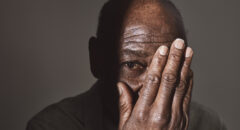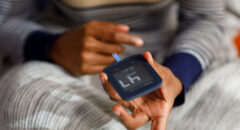
After you're first diagnosed with diabetes, it's normal at first to minimize the seriousness of the disease. But if the denial goes on too long and interferes with your self-care, the consequences can be dangerous.
By the time my friend -- we'll call her Tina -- was diagnosed with diabetes at age 52, she should have been well-prepared to deal with her illness. She had been looking after her diabetic mother for more than 20 years, managing her diet, medications, and daily blood tests. She also knew all too well what the disease could do. She had watched as diabetes destroyed her mother's eyesight and caused severe circulatory problems. With all that expertise, you'd think that Tina would have been a model patient.
RELATED: 11 Tips To Be Healthy For Life & Not Just A Moment
Living in denial
Instead, Tina kept saying she'd deal with her diabetes when she was ready. The problem was that that day never seemed to arrive. Her only concession to her diabetes was to cut back from drinking two 2-liter bottles of regular Coca-Cola each day to drinking only one. A hundred pounds overweight, Tina made no effort to go on a diet. She tested her blood only once every week or two, and didn't keep her doctor's appointments. Only two years after she was diagnosed with diabetes, she had circulatory problems of her own, including leg swelling so severe that walking was sometimes difficult. Still, she has not made any effort to deal with her illness.
Tina is suffering from denial, a common problem among diabetics and other people with chronic illnesses. "This can't be happening to me," is often someone's first reaction after learning he or she has a serious medical problem. It's not unexpected that a person with a life-altering disease might first rush to minimize its importance. In fact, it's a normal reaction and way of coping when diagnosed with a grave or chronic ailment.
But if denial goes on too long and interferes with getting the care you need, it's not just counterproductive: It's dangerous. Diabetics who refuse to acknowledge their illness are likely to develop serious diabetic complications, including circulatory and eye disorders, kidney disease, and heart disease. These problems, in turn, can potentially lead to blindness, amputation, and even death.
For Tina, denial is not just a stage in learning to accept her illness, but an ongoing problem that threatens her very life.
" Everyone who is diagnosed with diabetes has to go through stages to accept their diagnosis," says Laura Riggi, a certified diabetes educator in New York City. "Fear, anger, and denial are normal reactions to being told that you have diabetes, but you need to work through it in order to take the steps you need to deal with your diabetes."
Long-term denial may seem easier than learning to cope with the illness, because with denial you're convinced there isn't anything to cope with -- no need to change your habits and routine.
Riggi says that like my friend Tina, patients may drag their feet because they don't feel ill at first. "But if their vision gets blurry or they havenumbness in their feet," she adds, "then they may suddenly decide they have to do something."
Moving past the denial
If you've recently been diagnosed with diabetes -- or even if you've lived with it for years -- how do you know if your emotions are a part of the normal denial process or something more serious? The American Diabetes Association has a list of warning signs that suggest denial has become a problem.
For example, you tell yourself that you just have a little bit of sugar in your blood, or a "touch" of diabetes. But diabetes is diabetes -- there's no such thing as just a little, whether your blood sugar is very high or just a bit above normal.
Other warning signs include convincing yourself that a bite or two of a high-sugar food won't hurt, ignoring sores that won't heal, putting off seeing a doctor, ignoring meal planning, forgetting to examine your feet every day, and continuing to smoke.
RELATED: 10 Changes In Your Body You Should Never Ignore
You're also in denial, according to the ADA, if you don't regularly test your blood glucose levels. You may prefer to believe that you don't need to test because you can "tell" what your blood sugar is by how you feel -- a recipe for trouble. You're taking risks if you feel you can't ask your family members to change their eating habits or fear you might have to eat alone. And finally, you're in denial if you tell yourself that because you only take oral medications, your diabetes isn't serious.
Of course, even if you deal with your diabetes well, denial may creep back in once in a while. This is normal. In other cases, Laura Riggi says, fear can overwhelm diabetics and paralyze them from taking action. "And sometimes," she says, "people just get tired of all that goes into their care." When this happens, it's important that you learn to recognize the warning signs so you can get back on track.
If you're still plagued by denial, you can start to take control by writing down your care plan and health care goals and learning to understand why they are important, according to the ADA. Be realistic and remember that whatever your goal -- say, losing 50 pounds -- it might take a while for you to get there.
Remember, too, that a good support system is essential to good diabetic management. Talk to your family and friends so that they will understand your needs and what they can do to help. Consider consulting a diabetic educator and a nutritionist for help as well. And if concerns about your diabetes are overwhelming you and you feel depressed, speak to your doctor. There are millions of other diabetics out there struggling with the same issues, so you shouldn't have to feel alone.
* All the names of the diabetic patients in the article have been changed.








